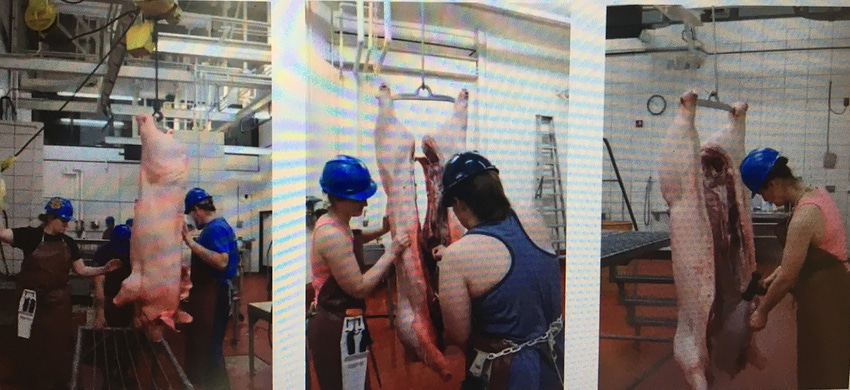SDSU Meat Lab steps up to help producers in need
From May 12 to July 31, staff slaughtered 392 hogs, shipped 150 carcasses and produced 32,817 pounds of finished product at the facility.

This past spring and summer, it almost became difficult to keep track of all the folks who were stepping up to help pork producers take market hogs off their hands due to COVID-19 supply chain disruptions. From auction barns and butchering parties to meat lockers and university meat labs, the response to help producers was immense.
One of those industry partners that stepped up to slaughter misplaced market hogs was the South Dakota State University Meat Lab. A fully inspected slaughter facility for all red meat species, the SDSU Meat Lab also has the ability to portion on the fabrication side and produce fully cooked or further processed products. However, since the meat lab was built in the 1980s, the main purpose for the facility has been to support research, teaching and SDSU Extension.
During the virtual SDSU Swine Day on Tuesday, Keith Underwood, associate professor in the Department of Animal Science, told attendees the SDSU Meat Lab typically sees 600 to 800 students come through every semester for instruction, with another 10 to 15 undergraduate students who annually work there to get more hands-on training.
However, with campus shuttered since March, most of the meat lab research had been put on hold and by early May, the students, faculty and staff were focusing solely on final exams and filling up the lab freezers. Then a call came from the top — that is the Governor's Office of South Dakota — asking if the SDSU Meat Lab may be able to help harvest these market hogs with no place to go.
"This was a very big collaborative effort," Underwood says. "I believe that there was some push from the industry to say that SDSU had a shuttered meat facility that maybe could help in some slaughter capacity. Our locker plants were pretty well booked up and quite busy at the time and with things going on with COVID-19 in some of our larger plants, and then learning how to deal with the CDC guidelines and regulations and not being able to operate at a 100% capacity, anything we could do to help, was hopefully beneficial. So, as we were asked to do that, we rounded up as many of our trained staff as we possibly could and said, 'here's our task, we're going to get going.'"
Initially the staff focused on slaughtering and processing 20 hogs a week, but as requests started coming in, the SDSU Meat Lab started taking on more, bumping up to 30, 60, and even 90 one week in June.
"Our biggest lessons learned were to not to overwork our help," Underwood says. "They are super dedicated folks, and they knew they had a job to do and worked through soreness and pain. Having a few more staff members would probably have been helpful, to ease that burden on those folks so we could rotate some of those jobs and make it not quite so monotonous and maybe not as hard physically on those folks."
From May 12 to July 31, a total of 392 hogs were slaughtered, 150 carcasses were shipped and 32,817 pounds of finished product were produced at the SDSU Meat Lab. The finished pork products were distributed by the South Dakota Pork Producers Council and Pipestone System at food giveaways around the state, and the carcasses were sent on to butchers to meet a demand for retail pork on the western side of the state.
"That's kind of what we did for our summer, and we hope it was beneficial to some of the producers that were a little long on pigs," Underwood says. "As you can see, we only slaughtered about 400 through our summer, but just to give you an indication, that's about twice as many animals as we traditionally slaughter in a year, and that's three times as many pigs we slaughter in a year. So, for us, that was pretty good production."
For a "somewhat antiquated" and "not nearly as mechanized" facility, Underwood says harvesting 30 hogs in a week involves a lot of lifting, a lot of moving. Every animal had to be hand-scraped, then eviscerated with handsaws, so he says, "it was a tremendous amount of work for students."
Well done SDSU! Thank you for stepping up to help our pork producers, thank you for producing a quality, nutritious, delicious protein to feed families in need across South Dakota and thank you for being a true pork industry partner.
About the Author(s)
You May Also Like




.jpg?width=300&auto=webp&quality=80&disable=upscale)
